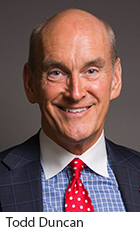
Developing High-Performance Teams
AMELIA ISLAND, FLA.–With the home purchase market expected to continue heating up, getting the most out of lending teams is critical to success. And Todd Duncan, says building high-performance teams comes down to a single word: trust.
 “We’re at a place where the better the trust, the higher the trust, the deeper the trust, the better the organization,” Duncan, founder and CEO of High Trust, Las Vegas and a New York Times best-selling author, said here at the Mortgage Bankers Association’s Independent Mortgage Bankers Conference.
“We’re at a place where the better the trust, the higher the trust, the deeper the trust, the better the organization,” Duncan, founder and CEO of High Trust, Las Vegas and a New York Times best-selling author, said here at the Mortgage Bankers Association’s Independent Mortgage Bankers Conference.
Duncan said high performance centers on four principles.
Trust Matters
“You have to have trust from the top on down,” Duncan said. “This is the biggest disrupter on the planet, and as leaders, we have to lead with trust. We see what lack of trust is doing to organizational performance in our space.”
There is a ripple effect of trust that starts with leadership and continues to the furthest reaches of the organization, Duncan said. “When a team does not trust each other, it creates a gap and disrupts the entire process,” he noted. “The most important question a CEO has to ask about the organization is, ‘do I have a level of trust?’ And, ‘do customers trust the organization?'”
Duncan said trust is being compromised on many levels. An Edelman Trust Barometer survey showed in 2017, trust in CEOs had dropped to a record-low 37 percent; only 36 percent of employees believed their leaders act with honesty and integrity.
Empathy–not technology–is the top business strategy to accelerate trust and increase conversion, Duncan said. “This is counterintuitive, but relationship is the center of humanity,” he said. “Without it, nothing else matters, including technology. Connection is rarely digital. Digital is about compounding and supporting the human connection, not replacing it. Connection leads to trust.”
Culture Rules
A Deloitte study showed culture, engagement and employee retention are not the top three challenges facing business leaders today. A Gallup poll showed only 31 percent of employees are engaged at work, with 51 percent disengaged and 17 percent “actively disengaged.”
“A strong, healthy company culture will drive performance,” Duncan said. “Culture is the flywheel that spins productivity…if your employees are not engaged, they are not producing.”
You can have a great culture and a lousy strategy and win, Duncan said; you can have a great strategy and a lousy culture and lose. “Culture eats strategy for lunch,” he said. “You have to have a high culture to win.”
Culture is the personality of a company or team, Duncan said. “It defines the environment in which teammates work.”
Connection Converts
“The depth of the relation that you have in your organization should be such that you are creating complete buy-in,” he said.
As a leader, Duncan said, every single person on the team must be connected, and the first connection is to the company.
“I do not want people on my team who are not converts,” Duncan said. “If you are not connected to the company, I don’t need you–you don’t fit. If we as leaders can push for connection, we can distance ourselves from companies who aren’t connected.”
If you don’t make an emotional connection with customers, then satisfaction is worthless, Duncan added. “What you want is every single human being that comes out of your eco-system connected,” he said. “If you have engagement, you get referrals, you fill your back office and you get new business.”
A Gallup poll showed business that optimize connections outperform competitors by 26 percent in gross margin and by 85 percent in total growth. “How much would that mean to your mortgage organization?” Duncan said. “Connection drives growth, retention, referrals and reviews.”
Accountability Accelerates
“We have to get people thinking that accountability is a good, healthy component of any organization,” Duncan said. “If we make accountability a centerpiece of a high-performance team, the team will embrace it because they know they will win.”
The job of a leader is to pull out the greatness of his/her followers, Duncan said. “The mark of a leader is to help someone achieve something that they didn’t know they could do,” he said. “That is your legacy as a leader. Legacy is in play every day.”
Goals alone do not work. “We have to get away from goal-setting as a business strategy,” Duncan said. “You have to be emotionally connected with your staff, with a plan that can make goals happen.”
